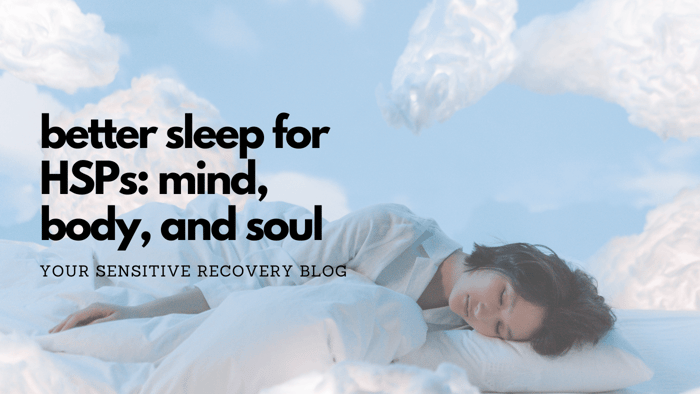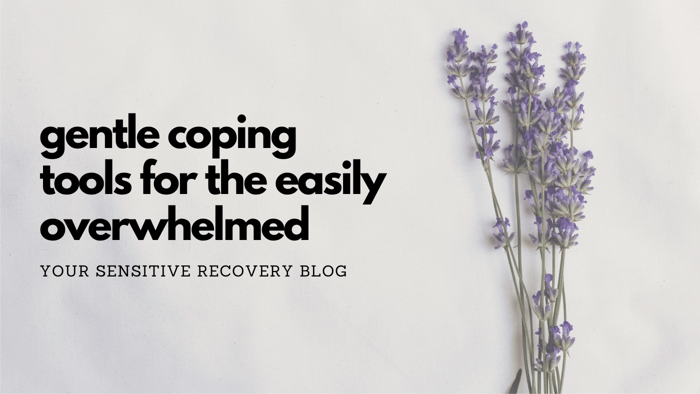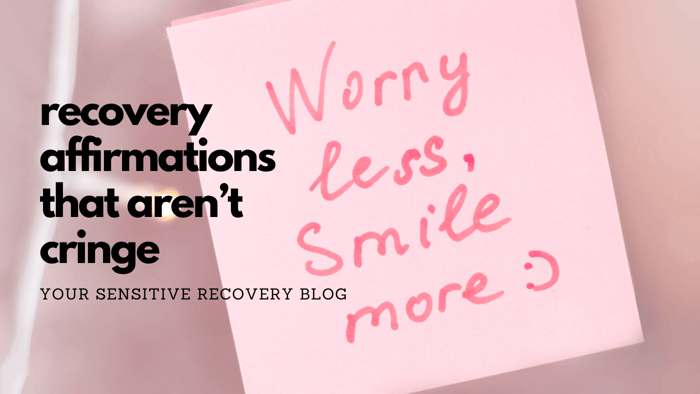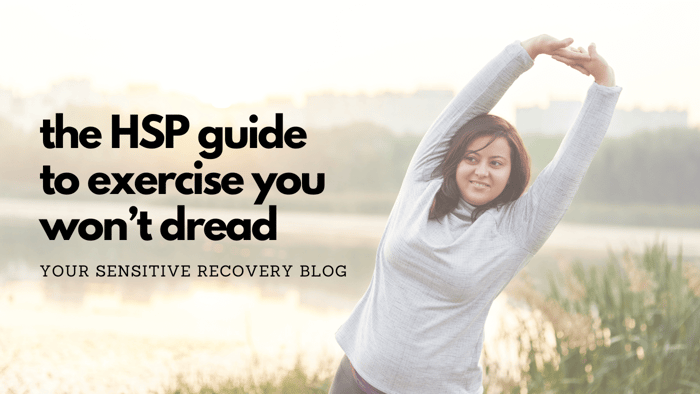As a Highly Sensitive Person, you experience the world in a uniquely intense way. This heightened intensity can be a beautiful gift, allowing you to perceive subtleties and nuances others may overlook. However, it can also make certain aspects of life, such as sleep, even more necessary and more challenging.
The constant barrage of stimuli can leave HSPs feeling overwhelmed and exhausted, so getting restorative rest is a MUST. As an HSP, and someone who has dealt with insomnia on and off throughout my life, I'm the QUEEN of sleep routines and have tried ALL the tricks and tips for improving my slumber-time.
In this blog post, I'll be sharing my favorite holistic strategies that will help you enhance your sleep by nurturing your mind, body, and soul. Whether you're struggling with falling or staying asleep, these strategies will help you find the peace and rest you require and deserve.
At Ease, Brain: Strategies for the Mind
As HSPs, we think deeply. And then we think deeply about thinking deeply (ha), so it makes sense that our minds might mistake the moments we lie down for rest as a time to go crazy with thoughts.
As a child, I often would lie awake concerned with big, existential concepts such as eternity. Nowadays, I'm more likely to get stuck looping on tomorrow's to-do list or the things that didn't go too well today.
Below are my top 2 favorite strategies for calming the mind:
Buttoning Up:
(Falling Asleep) Keep a small notebook by your bed, and before turning off the light, mentally review your day. Whenever you reach a moment in your review that turns a little light on in your brain, write down one word to summarize what it is. For example, if in your review you think about the rough phone call you had today and feel your stomach clench, write down "phone call." Or if when recalling that you did laundry today and you then have a random thought about the new shirt you need to return, write down, "return." It's just a way of signaling to your mind that you have noted this stressor and that you've got it. No rumination required, thank you very much. You don't even need to come back to these lists. They are just mental tools for "buttoning up" your day and your mind for sleep.
Dialogue With the Unconscious:
(During the Night) Waking up throughout the night is very normal, as we cycle through the different sleep stages. However, some people are not aware of these intermittent awakenings and seem to snooze soundly all night long. I don't seem to be one of them. Maybe it's an HSP thing, but I am fully conscious during my brief awakenings. While this used to bring about frustration and panic, now I use it as a time to talk myself back into rest. I reassure myself, with gentle language, like soothing a child back after a nightmare. For example: "It's not a problem that I have woken up. I am still resting. I have plenty of time left for sleep. I can rest deeply now. I am falling asleep again now." Our unconscious is always on alert for orders and wants to make what we're thinking our reality. So make sure you give it some good thoughts to work with.
Gently Drifting: Strategies for the Body
Our dear, sweet bodies do SO much for us, day in and day out. Getting forty-winks is essential for your body's optimal functioning. Here are my favorite strategies for preparing the body to gently drift off.
Heavy Eyes
(Falling Asleep/During the Night) This technique mimics the way our eyes become heavy when sleep is rapidly approaching. Don't worry too much about the counts for this exercise - go with what feels good. Slowly close your eyes for 5 seconds, then open them slowly for a few counts. Close your eyes again for 10 seconds, then slowly open them again. Close your eyes for 30 seconds with another brief opening. After a few rounds of closing and opening, allow your eyes to remain closed and observe the sensations of heaviness.
Vagus Reset
(Falling Asleep/During the Night) The vagus nerve plays a crucial role in the parasympathetic nervous system, which helps regulate relaxation, among other things. Resetting the vagus nerve can help reduce stress and anxiety and promote the onset of sleep. For this exercise, avoid straining your eyes as the goal is to keep them relaxed. If comfortable, lie on your back with your head straight. Take a few deep breaths then without moving your head, slowly shift your gaze to the right as far as you comfortably can. Hold for 15-60 seconds or until you yawn, sigh, or swallow. This indicates the activation of the vagus nerve. Return your gaze to the center, then repeat by looking to the left.
State of Surrender: Strategies The Soul
Let's not forget your soul. Your spirit, your essence, is also deserving of a good snooze. Try these strategies to ease your soul into a state of peaceful surrender.
Whispered Mantras
(Falling Asleep/During the Night) Gently reciting mantras, either whispering out loud or silently in your mind, is a wonderful way to soothe the soul and quiet a racing mind. I love using the statement, "I did my best, and now I rest" after a stressful day. A "loving-kindness meditation" is also a wonderful mantra. Begin by imagining the people you love, and one by one, wish them a variation of the following: "May you be happy, may you be healthy, may you be at peace."
Restful Rituals
Create your own evening ritual that sets the tone for a soulful release into sleep. You may choose to incorporate gratitude journaling, warm baths, a special tea, gentle stretches, a guided meditation or visualization, etc. Over time, as you participate in rituals, initiating the beginning of one allows the body to instinctively relax, as it can anticipate the soothing routine that it is embarking on. Routines can be especially helpful for Highly Sensitive People as they can provide a sense of predictability in an often chaotic world.
Sweet Dreams
Incorporating effective sleep habits is an important way Highly Sensitive People can nurture their minds, bodies, and souls. Prioritizing self-care and recognizing personal triggers for overstimulation can further enhance the ability to achieve a restful slumber.
Remember, quality sleep is a necessity for your overall well-being. It is worth the time and effort to find the strategies that work best for you.
May you be happy, may you be healthy, and may you rest peacefully.
😴
✨ Josie Munroe, LMFT is a licensed therapist and owner of JosieMunroe.com and Your Sensitive Recovery As a recovered clinician and Highly Sensitive Person, she loves supporting others on their journeys to form new, empowered relationships with food, their bodies, and their sensitivity. Join the newsletter for a weekly boost of hope and inspiration. You deserve a recovery that works for you! ✨





